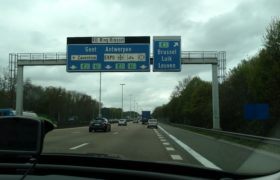Ex Fabula came up with a great idea for two blogs: Interview and write about two women who have worked or fought for change. This is about the first.
I’ve been trying to come up with a woman, someone I can reach by phone or invite for a cup of coffee, who works for change. I’m stumped, but not because I can’t find someone who does great things. The problem is there’s another woman I cannot get out of my head. One who really, truly works for change.
I cannot interview this woman because she lives far from Wisconsin and I have no practical way of getting to her, if she even lives there any longer. I have no idea how to call her or if she has a phone available to her. I don’t even know her name. Ten years ago, she and I spoke every weekday morning in the same place as she worked for change. Change was, in fact, her livelihood.
There’s a belt of highway surrounding the city of Brussels, Belgium, called the Ring. Driving on the Ring during the rush hours is a combination of bad Chicago traffic and the movie Death Race 2000. Astonishing numbers of people drive unthinkably fast, weaving in and out, hopping onto the shoulders to gain a few car lengths before the flashing blue lights of the politie squad cars catch up to them. There are odd intersections along the Ring where stoplights bring the mass of cars to a gear-grinding halt while those trying to get into the center of the Ring hastily rush through. The lights are often so short pedestrians aren’t able to cross; bicyclists proceed at a good clip.
The Ring is not a place you’d want to take a morning promenade, let alone stand in choking diesel exhaust fumes with a dirty old paper coffee cup begging for euro coins. But that is where I met our lady. I’m bad at ages, but I’d guess her to have been around her early 70s with grey hair, a weathered face and dark eyes emptied of expression. Her short, slender, hunched over form dressed primarily in greys and blacks, although some days she wore a bright azure blue scarf on her head or around her neck.
Each day, I would pull up to the long line of cars waiting at the very short light for my usual Ring intersection. Like an ancient ghost, she would walk slowly uphill along the sides of the cars on the line between the traffic lanes. She never knocked on nor pushed her tiny coffee cup into anyone’s open window, would likely never imagine the tactics of the ‘window washers’ in NYC I remember from my younger years. She simply walked and repeated in a soft, high voice, “S’il vous plait, madames et messieurs. S’il vous plait.”
In my first weeks in Brussels, I kept my change in a cup in my car, visible to anyone. I don’t remember when or why I first rolled down my window to give her a few coins, maybe 2€ or 3€. I guess my children were in the back seat and I saw an opportunity to demonstrate philanthropy to them. I scooped a few coins out of the cup and dropped them into hers. Expecting her to move on as she did with the few drivers in front of me who had also given, she shocked me by pointing calmly to my cup o’ car coins and very gently but insistently saying something in French I totally didn’t understand. Your Auntie Sue speaks only restaurant French; the lady with the blue headscarf wasn’t asking for ‘une tasse de café noir’ or ‘soupe du jour’, so I was clueless. Her words and gesturing rattled me and the light changed, so I took off without reply.
I reached my destination that day, the American Womens Club of Brussels, settled my kids in at the crèche (daycare) and grabbed a cup of café américain (plain ol’ cuppa Joe – why does everything sound classier in French?). I wandered up to the front desk where my friend, Genvieve, was volunteering. Genvieve was a Flemish Belgian (Sidebar: Flemish is sort of Dutch. Belgium is a ‘two in one’ country, but more fun stories about this at another time) but had gone to university in Michigan and loved Americans. She loved Canadians, too, whom she called Americans to playfully piss them off. I told her about the lady by the Ring and asked her for context.
“She is likely Romanian, likely brought here to beg.”
Who would do that to an old woman? “Her son, perhaps, or maybe her husband. The men cannot work here as they aren’t allowed to by law. Many are escaping crime since the Russian Mafia has taken over Eastern Europe.” According to a study done by the Brussels Institute of Statistics and Analysis and reported by the Belga news agency in 2018, Romanians currently represent 9.3% of foreigners living in Belgium, making them the second largest group of the 179 different nationalities living in the Brussels-Capital region (www.romania-insider.com). That represents nearly 40,000 Romanians living in the Brussels area in 2017. Just 23 years earlier, only 864 Romanians lived there. When I asked Genvieve this question ten years ago, we were then in the midst of what many Belgians described as a flood of Romanians.
“They come to escape the crime, but many are criminals themselves.” Genvieve described the problem of organized gangs, mostly petty thieves and shoplifters, stealing from businesses and breaking into cars and even homes. Belgians, usually tolerant of immigration, were frustrated, frightened and downright angry. “Because of the EU being here (the seat of the European Union is in a huge office complex on the west side of Brussels) and because our history is mostly trade with other countries, we are used to foreigners. However, this time it has not been good.”
But how could anyone put their own mother to work in the streets, begging for change? “They are desperate. If she doesn’t come home with enough money, they may not feed her or they may beat her. She has a quota. The sooner she gets enough money, the sooner she can go home.”
Ah, that must be why she had pointed to my cup o’ car change, I told Genvieve. She must have wanted more so she could go home early. Genvieve smiled the tolerant smile I now know her to give when spoiled Americans say something stupid. “More likely she was telling you not to leave your change out in your car like that. Someone will break in and steal it.”
That afternoon, I drove to my dry cleaners in the Flemish town where we lived. The Flemish are fiercely proud of being Flemish. They informatively share stories about how ‘everything good that Americans call French was first Belgian’, including French fries. Even the French Resistance of WWII was begun and based in Belgium. With pride, every daughter of Flanders I met would tell how the Nazis would ship Jews from all over Europe to towns in Belgium by train and attempt to establish concentration camps. At night, the townsfolk would bribe or overtake the guards and spirit away the prisoners. That morning, the camp Kommandant would round up the Flemish in the town square. “Wo sind meine Juden?” The Flemish would quietly smoke their cigarettes while their homes were searched and burned, the men often beaten and imprisoned themselves without ever giving up or giving in. The Flemish retain a historic awareness of human rights, even in the face of devastating personal loss.
My dry cleaner was a fierce proponent of Flemish pride. It angered her that I was taking French lessons instead of Flemish, so she taught me every Flemish word and piece of history she could. I asked her for my change in coins. “You prefer the coins?” I explained I wanted to refill my cup o’ car change, now hidden in the center compartment, so I could give coins to the lady by the Ring. “Madame, you encourage crime! You must not pay them!” The Romanians, she said, were the source of all crime in Belgium. To give the lady my change was to support criminals. I asked her about what Genvieve had said, if she thought the lady would be beaten or starved. “It is possible.” Well then, I said, at least that won’t happen today.
Easy answers don’t exist for most of the world’s problems, regardless of where you drink your tasse de café. Women around the world work for change. They scrape and they beg and they sell themselves over and over again for less than the money we carry around in our cars. If they bring home a few coins, perhaps they get something to eat and someplace to sleep unmolested. If they don’t, God help them. So they work, for change, and perhaps some days wear a blue scarf on their heads, daring to dream of change other than the stuff at the bottom of a paper cup.
On International Women’s Day/Month, let us celebrate the world’s brilliant women who use their educations, status and notoriety to create change. Then remember the desperate women who need it.






Leave A Comment